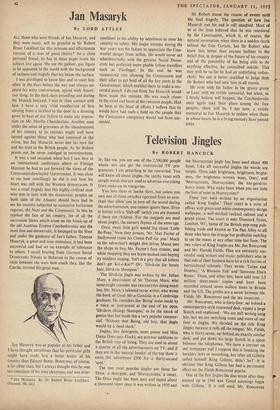Jan Masaryk
By LORD ATTLEE ALL those who were friends of Jan Masaryk, and they were many, will be grateful to Sir Robert Bruce Lockhart for this intimate and affectionate memoir of a man of great charm.* As a close personal friend, he has in these pages made his subject live again. We see the gallant, gay figure as he appeared to the world with the background of sadness and tragedy that lay below the surface.
I was privileged to know him and to meet him often in the days before the war and always en- joyed his witty conversation, spiced with Ameri- can slang. In the dark days preceding and during the Munich betrayal, I was in close contact with him. I have a very vivid recollection of him coming from a sickbed to the door in a dressing gown to hear of our failure to make any impres- sion on Mr. Neville Chamberlain. Another man under the sense of grievance at the abandonment of his country to its enemies might well have turned against those who had connived at the crime, but Jan Masaryk never lost his love for and his trust in the British people. As Sir Robert points out, he never indulged in recriminations.
It was a sad occasion when last I saw him at an international conference where as Foreign Minister he had to put forward the views of the Communist-dominated Government. It was clear to me how unwillingly he did it and how his heart was still with the Western democracies. It was a cruel tragedy that this highly civilised man who was in tune with the democratic peoples on both sides of the Atlantic should have had to see his country subjected to successive barbarous regimes, the Nazi and the Communist. In this he typified the fate of his country, for of all the succession States which arose on the break-up of the old Austrian Empire Czechoslovakia was the most free and democratic. It belonged to the West and under the guidance of Jan's father, Thomas Masaryk, a great and wise statesman, it had been successful and had set an example of tolerance to others. I recall hearing from German Social Democratic friends in Bohemia in the course of visits between the wars how much they, like the Czechs, revered this great man.
Jan Masaryk was as popular as his father and I have thought sometimes that his particular gifts might have made him a better leader of his country than Eduard Benes. Benes was, of course, a far abler man, but I always thought that he was too conscious of his own cleverness and was over- * JAN MASARYK. By Sir Robert Bruce Lockhart. (Putnam, 10s. 6d.) confident in his ability by adroitness to steer his country to safety. His major mistake during the war years was his failure to appreciate the Com- munist danger from within. He would never act wholeheartedly with the genuine Social Demo- crats but preferred more pliable fellow-travellers such as Fierlinger. In the end he was manoeuvred into allowing the Communists and their allies to get hold of all the key posts in the Government, which enabled them to make a suc- cessful putsch. 1 do not think Jan Masaryk would have made this mistake. He was much closer to the mind and heart of the common people,Had he been at tIv2 head of affairs I believe that he would have had such a hold on the people that the Communist conspiracy would not have suc- ceeded. Sir Robert traces the course of events until the final tragedy. The question of how Jan Masaryk met his end is still unsolved. Most of us at the time believed that he was murdered by the Communists, which is, of course, the natural assumption when there is a sudden death behind the Iron Curtain, but Sir Robert who knew him better than anyone inclines to the belief that, in despair of the future of his country and of the possibility of his being able to do anything effective, he committed suicide. This may well be so for he had an underlying melan- choly. No one is better qualified to judge than Sir Robert who had seen him in all moods.
He rests with his father in the grassy grave at Lany with no visible memorial, but when, as I firmly believe will happen, the Czechoslovaks once again take their place among the free peoples, there will be, I am sure, a visible memorial to Jan Masaryk to endure when those in whose hearts he is a living memory have passed away.


































 Previous page
Previous page